Congratulations upon what is your first full year results⏤ strong double-digit growth across all the major fundamentals. First of all, this was your first assignment as CEO; in a new…
FACTS BEHIND THE FIGURES: 1-on-1 with MTN Uganda’s Sylvia Mulinge Last week, MTN Uganda released its 2023 financial performance reporting steady data and fintech growth as well as a strong voice recovery, all underpinned by a record 2.3 million growth in overall subscribers, the engine of every telco. On the sidelines of a media conference to announce the results, CEO East Africa Magazine's Muhereza Kyamutetera, caught up with Sylvia Mulinge, the telco's CEO to understand some of the key facts behind this phenomenal growth.


